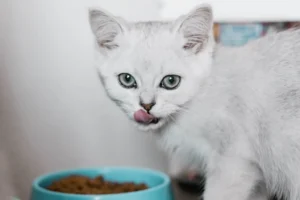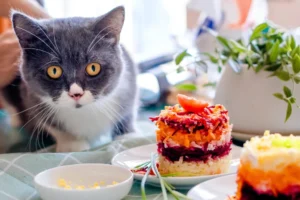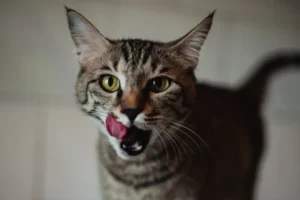Cats are known for their unique tastes and preferences, often leaving pet owners wondering why their furry feline friends have such specific likes and dislikes. One common question that many cat owners have is: why does my cat love ham? In this blog post, we will explore the reasons behind your cat’s affinity for this particular deli meat, providing insight into their behavior and preferences.
The Appeal of Ham to Cats
Cats have a natural affinity for protein-rich foods, and ham is no exception. The savory taste and tender texture of ham can be incredibly enticing to our feline friends. Additionally, the strong aroma of ham can stimulate a cat’s sense of smell, making it even more appealing to them.
But it’s not just the flavor that cats love; ham is also high in protein, which is essential for their overall health and well-being. Protein helps support muscle growth and repair, as well as providing energy for cats to stay active and playful.
However, it’s important to note that while cats may enjoy the taste of ham, it should only be given to them in moderation. Excessive consumption of ham can lead to digestive issues in cats, such as upset stomach or pancreatitis. So, while it’s okay to give your cat a small piece of ham as an occasional treat, it should not be a regular part of their diet.
Nutritional Considerations
When it comes to the nutritional value of ham for cats, it’s important to consider both the benefits and risks. Ham is a good source of protein and essential amino acids, which are crucial for a cat’s overall health. However, ham is also high in sodium and fat, which can be harmful to cats if consumed in large quantities.
To ensure that your cat is getting a well-balanced diet, it’s best to provide them with commercial cat food that is specifically formulated to meet their nutritional needs. If you do decide to give your cat ham as a treat, make sure to limit the amount and opt for unseasoned or low-sodium varieties.
Additionally, it’s worth noting that some cats may have food sensitivities or allergies to certain ingredients in ham, such as preservatives or additives. If you notice any digestive issues or allergic reactions after giving your cat ham, it’s best to consult with your veterinarian to determine the best course of action for your furry friend.
Remember, your cat’s health and well-being should always come first, so make informed decisions about what you feed them to ensure they live a long and happy life.
Potential Risks
Feeding your cat ham, even as an occasional treat, can pose some potential health risks. One of the main concerns is the high salt content found in processed ham, which can lead to issues like dehydration or even sodium poisoning in cats. Additionally, ham often contains preservatives and other additives that may be harmful to your cat’s well-being, especially if consumed regularly. These risks can impact your furry friend’s overall health and quality of life. It’s crucial to be mindful of the ingredients in the ham you’re feeding your cat and to limit their intake to prevent any adverse effects.
Alternative Options
If your cat has a hankering for ham, there are safer and healthier alternative options you can consider as a treat. One option is to offer cooked, plain meat like chicken or turkey as a substitute. These meats are lower in salt and additives compared to ham, making them a healthier choice for your cat. Another alternative is to provide specially formulated cat treats that are specifically designed to meet your cat’s nutritional needs without the risks associated with ham. These alternatives can satisfy your cat’s cravings without jeopardizing their health. Remember, moderation is key when it comes to treating your cat, so always keep portion sizes in check to maintain their well-being.
Additional Unique Insight
When looking for alternative options to ham, consider incorporating small amounts of fresh fruits or vegetables into your cat’s diet. Certain fruits like apples or vegetables like carrots can provide a crunchy and tasty treat for your furry friend. Just make sure to research which fruits and veggies are safe for cats to consume, as some may be toxic to them. This way, you can offer a variety of treats that are not only delicious but also nutritious for your cat’s diet.
Understanding Feline Preferences
Cats have a natural instinct as carnivores, which explains their love for ham. The savory aroma and taste of ham appeal to their carnivorous nature, making it a tempting treat for them. Cats are known to have a strong preference for meat-based foods, and ham is no exception. The high protein content in ham may also be a contributing factor to why your cat enjoys it so much. It triggers their primal instincts and satisfies their taste buds, making it a favorite among many feline friends.
Training Tips
If you’re looking to curb your cat’s ham cravings or introduce a healthier alternative into their diet, gradual training is key. Start by mixing small amounts of ham with their regular food to help them transition. Over time, gradually decrease the amount of ham and increase the portion of their regular food. Positive reinforcement with treats or toys can also help in steering their preferences away from ham. Remember, consistency is key in training your cat to adjust their eating habits. Additionally, consulting with your vet for a customized dietary plan can provide further guidance on how to manage your cat’s food preferences effectively.
Tip:
Introducing a variety of protein sources in your cat’s diet can help broaden their palate and reduce their reliance on ham. Experiment with different meats like chicken, turkey, or fish to provide a more balanced and nutritious diet for your feline companion.
Fun Facts About Cats and Food
Cats have some unique quirks when it comes to their food preferences. Did you know that cats are obligate carnivores, meaning they require a diet high in meat to thrive? This might explain why your feline friend goes crazy for that tasty slice of ham! Their natural instincts drive them to seek out protein-rich foods like ham to satisfy their nutritional needs.
Another interesting fact is that cats have taste buds specifically tuned to detect amino acids, which are abundant in meat. This could be why your cat seems to have a special affinity for ham, as it provides a delicious burst of savory flavor that cats find irresistible.
Additionally, cats have a keen sense of smell, which plays a significant role in their food preferences. The aroma of ham can be particularly enticing to your cat, making it a top choice when it comes to treats or mealtime.
So, next time your cat gives you those adorable pleading eyes for a piece of ham, you can rest assured knowing that their love for this tasty treat is rooted in their biological needs and instincts.
Useful Tip: Cats are obligate carnivores, so it’s essential to provide them with a diet rich in high-quality animal proteins like those found in ham. Be sure to offer ham in moderation as a special treat, as it should not make up the bulk of their diet to ensure they receive all the necessary nutrients for optimal health.
Alex, a passionate animal lover, has experience in training and understanding animal behavior. As a proud pet parent to two dogs and three cats, he founded AnimalReport.net to share insights from animal experts and expand his knowledge of the animal kingdom.









